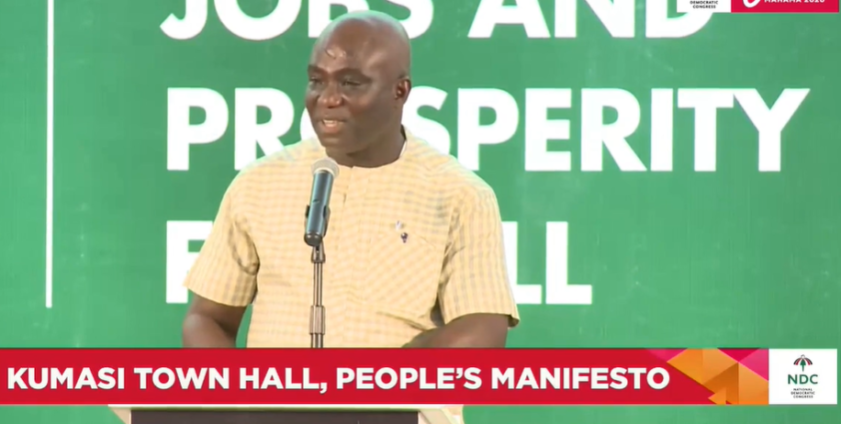
Audio By Carbonatix
The Minority spokespersons on Food and Agriculture, Eric Opoku, says that a 24-hour economy will enhance productivity and boost government revenue.
According to him, cocoa is a crucial pillar of the Ghanaian economy, contributing no less than $2 billion annually.
Mr Opoku noted that while Ghana is seeking a loan of $3 billion from the IMF over three years, cocoa alone can generate $2 billion each year.
The Member of Parliament (MP) for Asunafo South lamented that under the current administration led by President Akufo-Addo and Dr. Mahamudu Bawumia, the cocoa sector is struggling.
Speaking on the floor of parliament, he said, "It has collapsed. In fact, it is not something that we can even talk about. In 2016, Ghana produced 969,000 tonnes of cocoa; at that time, total office expenditure was around GHȼ363 million.
“In 2021, Ghana produced 1,045,000 (tonnes) and office expenditure ballooned to GH₵1,700,000,000. In 2022, cocoa production declined from 1,045,000 tonnes to 683,000 tonnes, but office expenditure increased from1.7 billion to 2.6 billion (Cedis).
“The worst of all was that in 2023, cocoa production declined further to 655,000, but office expenditure did not decline. It increased to 3.4 billion.”
Mr. Opoku said the Auditor General has reported to parliament that it is largely due to head office expenditure.
The MP noted that Ghana is continuously delaying payment of debts. He explained that external creditors have extended the deadline for Ghana until 2026, which means Ghana has only 2025 to prepare for and repay its debts in 2026.
Mr Opoku cautioned that $1.6 billion of the $3 billion IMF facility has already been utilised. He warned that if proper investments are not made with this money, there will be insufficient funds to cover the payments due in 2026.
The MP said that the current challenges are merely being deferred to the next generation.
“To get out of this mess, all we have to do is work hard. We used to work for eight hours. What we are saying is that we are not going to work to rest for the 18 hours.
"Let’s make economic use of all these hours so that within a day, if we are producing goods valued at $20 million, we want to make it $60 million. At the end of the day, if we are putting together the Gross Domestic Product, the value would be very huge, and when you take the Debt to GDP, Ghana would have a sound economy that everybody can associate with.”
Mr. Opoku stated that every economic policy is designed to address a specific issue.
He pointed out that Ghana's current economic challenges include high unemployment, lack of industrial activity, low revenue, very low incomes, and overwhelming debt.
Mr. Opoku emphasised that a policy is needed to boost production, industrialise the economy, add value to agricultural raw materials, and create jobs to enhance productivity.
“So, you need one policy that can address all these issues, including the ballooning exchange rate with disastrous consequences on the growth of our economy, and we think that with the 24-hour economy, all this issue can be addressed”.
Latest Stories
-
Ghana is rising again – Mahama declares
5 hours -
Firefighters subdue blaze at Accra’s Tudu, officials warn of busy fire season ahead
5 hours -
New Year’s Luv FM Family Party in the park ends in grand style at Rattray park
5 hours -
Mahama targets digital schools, universal healthcare, and food self-sufficiency in 2026
5 hours -
Ghana’s global image boosted by our world-acclaimed reset agenda – Mahama
6 hours -
Full text: Mahama’s New Year message to the nation
6 hours -
The foundation is laid; now we accelerate and expand in 2026 – Mahama
6 hours -
There is no NPP, CPP nor NDC Ghana, only one Ghana – Mahama
6 hours -
Eduwatch praises education financing gains but warns delays, teacher gaps could derail reforms
6 hours -
Kusaal Wikimedians take local language online in 14-day digital campaign
7 hours -
Stop interfering in each other’s roles – Bole-Bamboi MP appeals to traditional rulers for peace
7 hours -
Playback: President Mahama addresses the nation in New Year message
8 hours -
Industrial and Commercial Workers’ Union call for strong work ethics, economic participation in 2026 new year message
10 hours -
Crossover Joy: Churches in Ghana welcome 2026 with fire and faith
10 hours -
Traffic chaos on Accra–Kumasi Highway leaves hundreds stranded as diversions gridlock
10 hours

